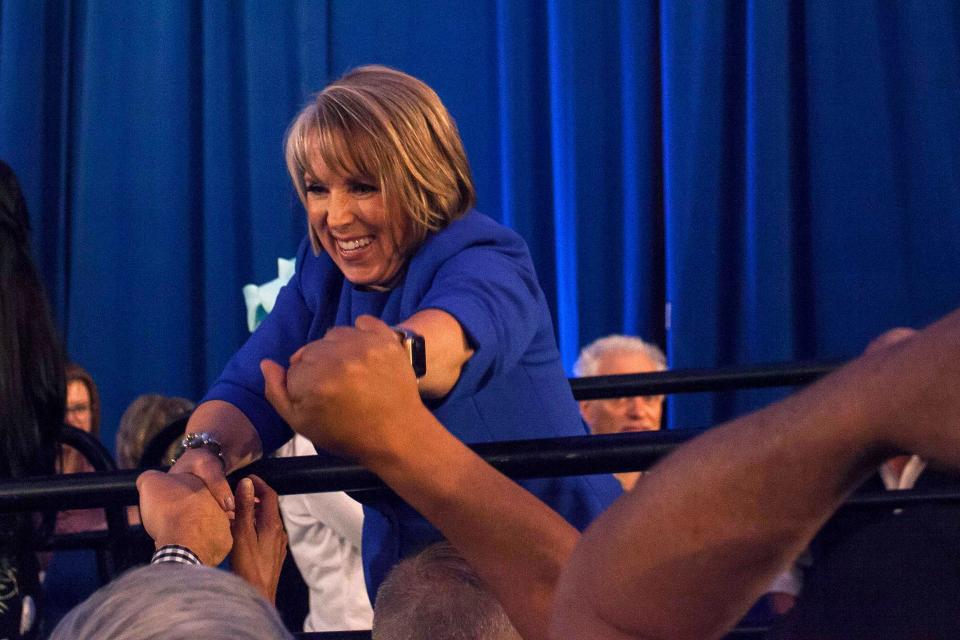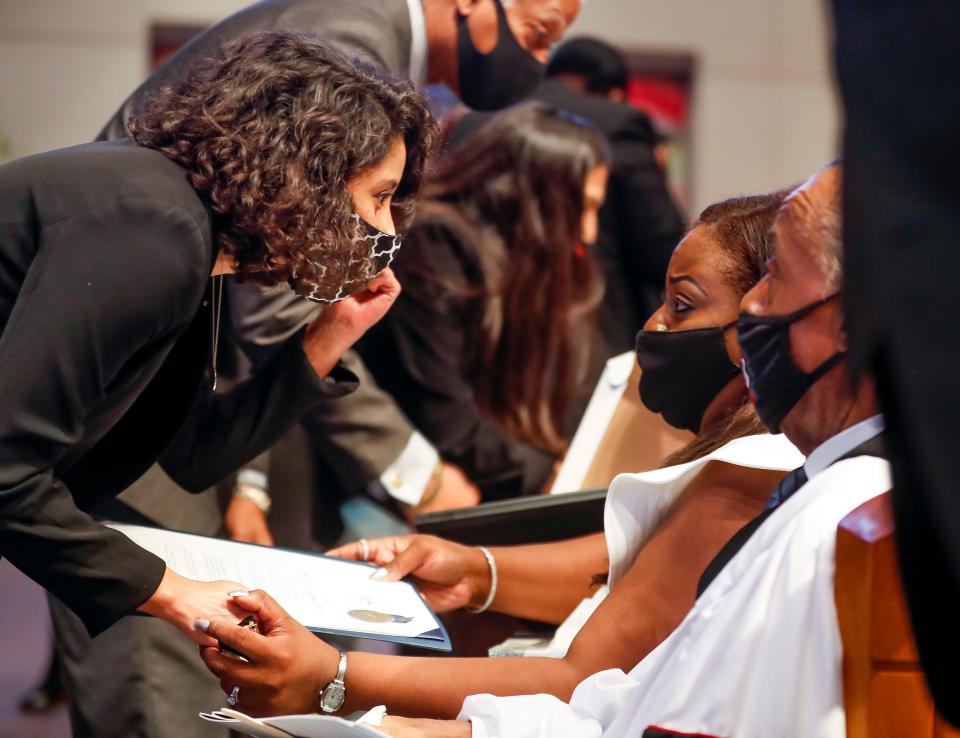In Texas, Mayra Flores is latest Latina to win big in politics. Can others do the same?
- Oops!Something went wrong.Please try again later.
Republican U.S. Rep. Mayra Flores of Texas became the first Mexican-born woman to be sworn into Congress last week, the latest major victory for Latinas, who are increasingly running for political office – and winning.
Latinas represent 9.1% of the total U.S. population, according to the U.S. Census. But Latinas make up only 2.8% of all lawmakers in Congress, according to the Center For American Women and Politics. They are also underrepresented in local and state political offices.
Recent election cycles, however, have shown Latinas clamoring to take up more space in U.S. politics. Twenty-seven Latinas have won primary battles for the U.S. House of Representatives so far this election cycle. That’s up from 2018 when 20 Latinas won their primary contests.
"We have seen places like Texas, Arizona and Florida, more Latinas are running and winning," said Anna Sampaio, a politics, race and gender professor at California’s Santa Clara University. "There are several factors at work in both of those equations, but we see underrepresentation as well."
Political experts said Latinas are deeply underrepresented in political office for a variety of factors, including discrimination based on gender, ethnicity or race that can limit economic, education and other opportunities. Latinas are the most likely group of people actively discouraged from running by their political party, according to the National Hispanic Caucus of State Legislators.
State Sen. Sonia Chang-Díaz, who was running for governor of Massachusetts before she dropped out Thursday, said the underrepresentation of Latinas holding political office correlates with multiple barriers, including psychological, financial, childcare and being a marginalized community member.
“We know that you don’t have to raise the most money in order to win office, I’m living proof of that. But you need to raise enough to run a vetted campaign,” said Chang-Díaz, who became the state’s first Latina state senator in 2009.

Stephanie Lopez, program director for LatinasRepresent, a national, nonpartisan organization focused on increasing the number and diversity of Latinas in public office, said many Latina candidates are still fighting off outdated assumptions about their electability.
"It is incredibly difficult for Latinas to run for office, I think that needs to be said. A ton of barriers exist even before they decide to run," Lopez said. "A lot of the time, they're not receiving the support from major parties. So, what are the options, wait for them or run as independents?"
Despite the barriers to a victorious Election Day, more Latinas have steadily won high-profile electoral contests in recent years, with Alexandria Ocasio-Cortez becoming the youngest woman at the time to serve in Congress in 2019 and New Mexico Gov. Michelle Lujan Grisham becoming the nation’s first Latina governor in 2019. There’s also Elizabeth Guzmán and Hala Ayala, who in 2017 became the first Hispanic women elected to Virginia’s House of Delegates. That same year, Catherine Cortez Masto (D-NV) became the first Latina to serve in the U.S. Senate.
"Communities realize that they need to be politically engaged," said Assemblywoman Michaelle Solages, chair of the New York State Black, Puerto Rican, Hispanic & Asian Legislative Caucus. "And right now, Latinas realize that they need the political power to change the dynamics in their community."
Christina Bejarano, a professor of political science at Texas Woman's University whose research focuses on Latinas in politics, said much of the growth of women of color running for political office stems from the growing networks of political and civic organizations aimed at helping such candidates.
Bejarano said Latinas sometimes can benefit at the polls by leaning on their identity to draw support and interest from multiple demographic groups, such as other women and people of color.
"They often run as highly qualified candidates, likely due to the expected obstacles they will encounter running as women of color,” Bejarano said.
Flores’ campaign focused on her culture, pointing to her parents' history of being migrant workers. Ocasio-Cortez, meanwhile, has celebrated her family’s links to Puerto Rico and aligned with other women of color in Congress.

Sonja Diaz, founding director of the University of California, Los Angeles' Latino Policy & Politics Institute, said Latinas do not need to run in a Latino-majority district to win.
"One thing that is true from our political science research and history is that Latinas are ideal candidates who can win districts that are a variety of voters from a different race or ethnic backgrounds," Diaz said.
Latinas candidates need more support
Kelly Dittmar, director of research at the Center for American Women and Politics, said the key for Latinas is to maintain political momentum. She said profound structural change must happen within the major political parties to bolster the success of Latina candidates.
"You need to create networks, what we call a support infrastructure, for women in ways that speak to their own distinctive experience," said Dittmar. "There is also the potential to create a funding stream, reducing some of the financial barriers."
In November, the midterm elections will show how well Latinas candidates perform this election cycle. Flores is likely to face a tougher road to victory when she faces off against Democratic Rep. Vicente Gonzalez in a redrawn district that leans overwhelmingly Democratic.

Whether Flores wins or loses, Chang-Díaz and others are hoping to see more Latinas in office in the near future.
"I want to be clear; we should be encouraging more Latinas to run," said Chang-Díaz. "Our country needs more Latinas in offices. We need to have people at the table who represent our country's full breadth and diversity."
This article originally appeared on USA TODAY: Mayra Flores won big in Texas. Can other Latinas do the same?

